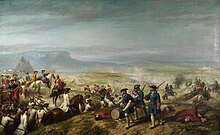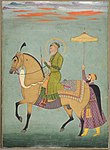1707
Appearance
| Millennium: | 2nd millennium |
|---|---|
| Centuries: | |
| Decades: | |
| Years: |
| 1707 by topic |
|---|
| Arts and science |
| Countries |
| Lists of leaders |
| Birth and death categories |
| Establishments and disestablishments categories |
| Works category |
| Gregorian calendar | 1707 MDCCVII |
| Ab urbe condita | 2460 |
| Armenian calendar | 1156 ԹՎ ՌՃԾԶ |
| Assyrian calendar | 6457 |
| Balinese saka calendar | 1628–1629 |
| Bengali calendar | 1114 |
| Berber calendar | 2657 |
| British Regnal year | 5 Ann. 1 – 6 Ann. 1 |
| Buddhist calendar | 2251 |
| Burmese calendar | 1069 |
| Byzantine calendar | 7215–7216 |
| Chinese calendar | 丙戌年 (Fire Dog) 4404 or 4197 — to — 丁亥年 (Fire Pig) 4405 or 4198 |
| Coptic calendar | 1423–1424 |
| Discordian calendar | 2873 |
| Ethiopian calendar | 1699–1700 |
| Hebrew calendar | 5467–5468 |
| Hindu calendars | |
| - Vikram Samvat | 1763–1764 |
| - Shaka Samvat | 1628–1629 |
| - Kali Yuga | 4807–4808 |
| Holocene calendar | 11707 |
| Igbo calendar | 707–708 |
| Iranian calendar | 1085–1086 |
| Islamic calendar | 1118–1119 |
| Japanese calendar | Hōei 4 (宝永4年) |
| Javanese calendar | 1630–1631 |
| Julian calendar | Gregorian minus 11 days |
| Korean calendar | 4040 |
| Minguo calendar | 205 before ROC 民前205年 |
| Nanakshahi calendar | 239 |
| Thai solar calendar | 2249–2250 |
| Tibetan calendar | 阳火狗年 (male Fire-Dog) 1833 or 1452 or 680 — to — 阴火猪年 (female Fire-Pig) 1834 or 1453 or 681 |
Wikimedia Commons has media related to 1707.

1707 (MDCCVII) was a common year starting on Saturday of the Gregorian calendar and a common year starting on Wednesday of the Julian calendar, the 1707th year of the Common Era (CE) and Anno Domini (AD) designations, the 707th year of the 2nd millennium, the 7th year of the 18th century, and the 8th year of the 1700s decade. As of the start of 1707, the Gregorian calendar was 11 days ahead of the Julian calendar, which remained in localized use until 1923.
In the Swedish calendar it was a common year starting on Tuesday, one day ahead of the Julian and ten days behind the Gregorian calendar.
Events

January–June
- January 1 – John V is crowned King of Portugal and the Algarves in Lisbon.
- January 16 – The Treaty (or Act) of Union, of the two Kingdoms of Scotland and England, is ratified by the Parliament of Scotland.
- March 3 – Emperor Aurangzeb dies in Delhi.
- March 19 – The Act of Union with Scotland is ratified by the Parliament of England.
- April 25 (April 14 Old Style) – War of the Spanish Succession – Battle of Almansa: The Bourbon army of Spain and France (with Irish mercenaries) under the French-born Englishman James FitzJames, 1st Duke of Berwick, soundly defeats the allied forces of Portugal, England, and the Dutch Republic led by the French-born Huguenot (in English service) Henri de Massue, Earl of Galway. Following this, Philip V of Spain promulgates the first Nueva Planta decrees, bringing the Kingdoms of Valencia and Aragon under the laws of the Crown of Castile.[1]
- May 12 (May 1 Old Style) – The new sovereign state of Great Britain comes into being, as a result of the Acts of Union, which combine the Kingdoms of Scotland and England into a single united Kingdom of Great Britain,[2] and merge the Parliaments of England and Scotland, to form the Parliament of Great Britain.[3]
- May 23 – Volcanic eruption in the Santorini caldera begins.
July–December
- July 29–August 21 – War of the Spanish Succession – Battle of Toulon: The Allies are obliged to withdraw, but the French fleet is effectively put out of action.
- October 22 – Scilly naval disaster: Four British Royal Navy ships run aground in the Isles of Scilly, because of faulty navigation. Admiral Sir Cloudesley Shovell and at least 1,450 sailors all drown.
- October 23 – The Parliament of the Kingdom of Great Britain first meets in London.
- October 28 – The Hōei earthquake (the most powerful in Japan until 2011) strikes, with an estimated local magnitude of 8.6.
- November 30 – War of the Spanish Succession: The Siege of Pensacola ends, with the Spanish successfully defending their fort.
- December 16 – The last recorded eruption of Mount Fuji begins in Japan.
- December 24 – The first British Governor of Gibraltar, directly appointed by Queen Anne, Roger Elliott, takes up his residence in the Convent of the Franciscan Friars.
- December – Charles XII of Sweden launches his campaign to conquer Russia, marching to the east from Leipzig with 60,000 coalition troops. Another 16,000 soldiers are waiting on the outskirts of Riga, guarding the Swedish supply lines.
Date unknown
- A fortress is founded on the future site of Ust-Abakanskoye (modern Abakan).
- The Lao empire of Lan Xang officially ends, and splits into the kingdoms of Vientiane, Luang Prabang, and Champasak.
- Hacienda Juriquilla is built in Querétaro, Mexico.
Births
- January 13 – John Boyle, 5th Earl of Cork, Irish writer (d. 1762)
- February 1 – Frederick, Prince of Wales (d. 1751)
- February 14 – Claude Prosper Jolyot de Crébillon, French novelist (d. 1777)
- February 25 – Carlo Goldoni, Italian playwright (d. 1793)
- March 7 – Stephen Hopkins, Founding Father of the United States (d. 1785)
- March 14 – Johan Ihre, Swedish philologist and historical linguist (d. 1780)
- March 23 – Henry Scudamore, 3rd Duke of Beaufort (d. 1745)
- April 10 – John Pringle, Scottish physician (d. 1782)

- April 15 – Leonhard Euler, Swiss mathematician and physicist (d. 1783)
- April 22 – Henry Fielding, British novelist and dramatist (d. 1754)
- April 25 – Léopold Clément, Hereditary Prince of Lorraine, French prince (d. 1723)
- May 1 – Michael Rogers, British soldier (d. 1799)
- May 12 – Francisco Salzillo, Spanish sculptor (d. 1783)

- May 23 – Carl Linnaeus, Swedish botanist (d. 1778)
- August 14 – Johann August Ernesti, German theologian and philologist (d. 1781)
- August 24 – Selina Hastings, Countess of Huntingdon, English Methodist leader (d. 1791)
- August 25 – King Louis I of Spain (d. 1724)
- September – Nathan Alcock, English physician (d. 1779)
- September 5 – John Forbes, British general (d. 1759)
- September 7 – Georges-Louis Leclerc, Comte de Buffon, French scientist (d. 1788)
- November 23 – Anna Karolina Orzelska, Polish adventurer (d. 1769)
- December 18 – Charles Wesley, English Methodist leader, brother of John Wesley (d. 1788)
- date unknown
- Giuseppe Bonici, Maltese architect and military engineer (d. 1779)
- Moshe Chaim Luzzatto, Italian rabbi, mystic, and philosopher (d. 1746)
- probable William Hoare, English painter (d. 1792)
Deaths
- January 4 – Louis William, Margrave of Baden-Baden, Germany (b. 1655)
- January 8 – John Dalrymple, 1st Earl of Stair, Scottish politician (b. 1648)
- January 10 – Philibert, comte de Gramont, French writer (b. 1621)
- January 16 – William Bowes, English politician (b. 1657)
- January 20
- Humphrey Hody, English theologian (b. 1659)
- Leopold Karl von Kollonitsch, Hungarian Catholic cardinal (b. 1631)
- January 22 – Richard Towneley, English mathematician and astronomer from Towneley near Burnley (b. 1629)
- February 22 – Giacinto Calandrucci, Italian painter (b. 1646)

- March 3 – Aurangzeb, Mughal Emperor of India (b. 1618)
- March 17 – Elisabeth Charlotte, Countess of Holzappel (b. 1640)
- March 27 – Jean-François Gerbillon, French Jesuit missionary active in China (b. 1654)
- March 30 – Sébastien Le Prestre de Vauban, French noble (b. 1633)
- April 2 – Gérard Edelinck, Flemish engraver (b. 1640)
- April 6 – Willem van de Velde the Younger, Dutch painter (b. 1633)
- April 24 – Walter Charleton, English natural philosopher (b. 1619)
- April 26 – Johann Christoph Denner, German musical instrument maker (b. 1655)
- April 28 – Christian, Duke of Saxe-Eisenberg (b. 1653)
- April 29 – George Farquhar, Irish dramatist (b. 1677)
- May 9 – Dieterich Buxtehude, German composer (b. c. 1637)
- May 10 – Johann Ernst III, Duke of Saxe-Weimar (b. 1664)
- May 19 – Jean II d'Estrées, French noble (b. 1624)
- May 21 – Joan Geelvinck, Dutch politician (b. 1644)
- May 24 – Henri Albert de La Grange d'Arquien, French Catholic cardinal (b. 1613)
- May 27 – Françoise-Athénaïs de Rochechouart de Mortemart, mistress of King Louis XIV of France (b. 1641)
- May 3 – Michiel de Swaen, Flemish poet (b. 1654)
- May 31 – Simon Patrick, English theologian and bishop (b. 1626)
- June 8 – Muhammad Azam Shah, Mughal emperor (b. 1653)
- June 15 – Giorgio Baglivi, Armenian doctor and writer (b. 1668)
- June 21 – Robert Phelips, English politician (b. 1619)
- June 23 – John Mill, English theologian (b. c. 1645)
- June 27 – Johann Zahn, German author (b. 1641)
- August 7 – Henry Poley, English politician (b. 1654)
- August 18 – William Cavendish, 1st Duke of Devonshire, English soldier, statesman (b. 1640)
- August 20 – Nicolas Gigault, French organist, composer (b. 1627)
- September 12 – Samuel Willard, American theologian (b. 1640)
- September 15 – George Stepney, British poet, diplomat (b. 1663)
- September 21 – Wilhelmus Beekman, Dutch politician (b. 1623)
- September 24 – Vincenzo da Filicaja, Italian poet (b. 1642)
- October 10 – Johann Patkul, Livonian nobleman, politician (b. 1660)
- October 22 – Sir Cloudesley Shovell, British admiral (b. 1650)
- November 26 – Leonhard Dientzenhofer, German architect (b. 1660)
- November 27 – Fitz-John Winthrop, Governor of the Connecticut Colony (b. 1637)
- December 1 – Jeremiah Clarke, English composer (b. 1674)
- December 24
- Noël Coypel, French painter (b. 1628)
- Karolina of Legnica-Brieg, Silesian noblewoman (b. 1652)
- December 27
- Robert Leke, 3rd Earl of Scarsdale, English earl, politician (b. 1654)
- Jean Mabillon, French palaeographer, diplomat (b. 1632)
- date unknown - Maria Clara Eimmart, German astronomer, engraver and designer (b. 1676)
- Julie d'Aubigny, French swordswoman, opera singer (b. 1670)
References
- ^ Payne, Stanley G. "Chapter 16: The Eighteenth-Century Bourbon Regime in Spain". A History of Spain and Portugal. Vol. 2. Madison: University of Wisconsin Press. ISBN 0-299-06270-8. Retrieved April 17, 2008.
- ^ Acts of Union 1707 parliament.uk, accessed 31 December 2010.
- ^ Williams, Hywel (2005). Cassell's Chronology of World History. London: Weidenfeld & Nicolson. p. 291. ISBN 0-304-35730-8.
